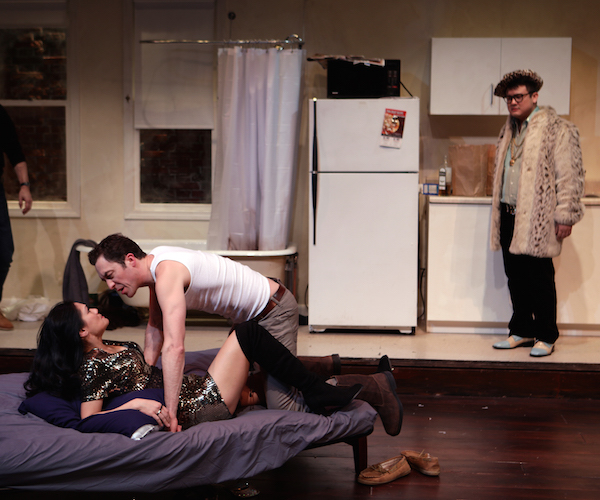Theater Review: “Stage Kiss” — The Stages of Romance
Stage Kiss is Sarah Ruhl’s whimsical contribution to the age-old artistic theme of art vs. life.
Stage Kiss by Sarah Ruhl. Directed by Courtney O’Connor at Lyric Stage Company, 140 Clarendon Street, Boston, MA, through March 26.

Celeste Oliva, Alexander Platt, and Michael Hisamoto in the Lyric Stage production of “Stage Kiss.” Photo: Mark S. Howard.
By Helen Epstein
If you are, like me, an admirer of the award-winning playwright Sarah Ruhl, you are grateful for any local productions of her work. Her many plays – Dead Man’s Cell Phone, In the Next Room (or the vibrator play), and Dear Elizabeth are three of my favorites — are piercingly intelligent and reliably appealing, as well as pertinent, full of quirky characters and surprises.
Stage Kiss, a play that walks a wobbly line between farce and romantic comedy, is longer and less polished than Ruhl’s best work, but addresses questions I’ve often wondered about: How do actors (and other performing artists) manage their emotional and sexual lives as they move between their roles on stage and at home? How do they maintain their bearings? When is a kiss a stage kiss, and when does it ignite an extra-theatrical relationship? Which ‘reality’ exerts a stronger hold: the one created by the playwright or the one generated by the actors’ attraction to each other? Stage Kiss is Ruhl’s whimsical contribution to the age-old artistic theme of art vs. life.
The backstage/play-within-a-play conceit evokes other contemporary works about actors, as well as having something of the atmosphere of Kiss Me Kate, Samuel and Bella Spewack and Cole Porter’s adaptation of The Taming of the Shrew.
Stage Kiss is about working actors, not stars, and begins with a woman auditioning for an off-off-off-Broadway director named Adrian Schwalbach. She (the leads are unnamed) is returning to the theater after 16 years, during which she parented her now-teenage daughter and did one widely-viewed anti-depressant commercial. Celeste Oliva is fun to watch as an alternately anxious, sympathetic, and flummoxed actress, trying desperately to cope with a series of unexpected events over which she has no control.
Ruhl gives us a delicious send-up of the audition process, including a self-important director (played convincingly by Will McGarrahan), the variable consequences of casting and miscasting, and the oft-made mistake of reviving a period play — in this case, it is an abysmal 1930s melodrama in which the female lead is given one month to live by her doctor.
“Am I to die in August?” She intones to her her husband Harrison (Craig Mathersis in a strong and solid Lyric Stage debut). “Stiff upper-lip darling!” he answers back lyrically. In addition to stilted elocution, the part calls for “some singing.” The tone-deaf actress attempts a song and reads four pages with the (gay) understudy Kevin. She is awful, but hired. When She arrives for rehearsal, she discovers that her first love, whom she broke up with barely out of adolescence, will be playing the male lead.
During the audition, performing kisses and come-ons with the nerdy Kevin (Michael Hisamo) was a fiasco that ends up with the understudy confessing his insecurity about projecting a heterosexual presence onstage. But performing the same stage business with her startled former lover (a competent but not nearly rakish or intense enough Alexander Platt) sets off sparks. He mocks her for having married a banker. She replies, “My mother told me never to marry an actor, No one who looks in the mirror more than you do.” But they wind up in bed, with complications.
Director Courtney O’Connor has assembled a very good cast and design team, who seem to have identified and capitalized on every detail and nuance of Ruhl’s edgy, multi-layered script. They work well as an ensemble and make complicated relationships crystal clear to the audience.
O’Connor is also adept at clearly delineating what’s happening on and off stage, on and off script, during rehearsal time and breaks, during the first play-within-a-play as well as the second. I particularly liked the way art imitated life in the design of the sets and costumes. In Act I the set came together slowly as rehearsals progressed, culminating in a curtain call at the opulent opening.
In Act II, when He and She have left their respective partners and are living in his grubby apartment, the director is inspired to photograph it and use it as the set of the low-life play — “I Love You Before I Killed You, or Blurry” that he himself has written and will produce, with the couple as his leads, at the Detroit Actor’s Theater.
Ruhl has great fun with many theatrical tropes and aspects of actor training, such as fight technique and the accents that She and He master in order to play a Brooklyn-born prostitute and an IRA soldier. The interaction between the characters they are playing evokes feelings as intense as those aroused by their stage kiss. When the actress’s banker husband and teenage daughter appear to fetch her, she is ready to go home.
A Stage Kiss is accomplished entertainment, but Sarah Ruhl is smart and proficient enough to have you leave the theater thinking about the varieties of kisses and varieties of love.
Helen Epstein is the author of or editor of 10 books of non-fiction. You can check them out here. plunkettlakepress.com.
Tagged: Courtney O’Connor, Culture Vulture, Lyric stage company of boston, Sarah-Ruhl
